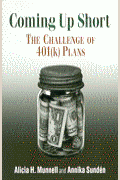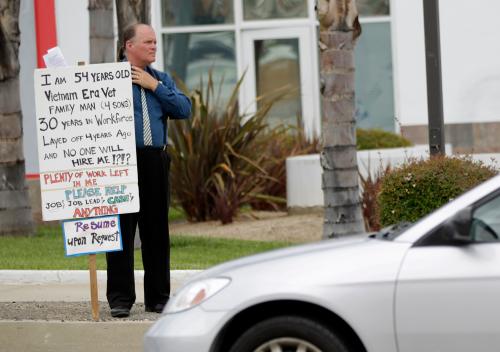The government’s report that the economy added only 74,000 jobs in December, while the unemployment rate dipped to 6.7%, has left many feeling dispirited and confused. Why does the unemployment rate drop when so few jobs are added?
Ugh. Awful. Payrolls +74k November revised from +203k to +241k October unchanged at +200k Unemployment falls from 7.0% to 6.7%.
— Justin Wolfers (@JustinWolfers) January 10, 2014
In an interview today with Brian Lehrer on his radio show from WNYC, Justin Wolfers answered questions about how the government measures unemployment, factors in labor force participation, and whether Congress will extend unemployment insurance. Excerpts from the show appear below:
How does the government measure someone who has dropped out of the job search?
When the government sorts out the unemployment rate it doesn’t just say “do you have a job or not?” It also adds a whole bunch of other questions: Do you want a job? Would you be willing and able to start? And, have you been looking for a job. …
And to make the definition of unemployed you have to: Not have a job, you have to be currently searching, and you have to be ready to start. … a three-pronged test. …
It’s a big part of the story. … The big puzzle over the past couple of years has been: if you look at the number of new jobs created during this recovery, it’s been a remarkably weak recovery. But if you look at what’s happened to the unemployment rate, it looks wonderful. … So, the real puzzle is, why is it that there are so many fewer unemployed people when there aren’t so many more jobs? And one part of the answer is actually just retirement. The baby boomers are aging, they’re hitting retirement age.
Are Retirees Counted the Same as People Who Want to Work but Can’t Find Anything?
No. At the top level the government thinks that people [are] in three buckets: You have a job. …Then there’s those who don’t have a job but are currently actively looking—they’re the unemployed. And then there are people don’t have a job and aren’t currently looking. Now within that bucket … there are people who have retired because they don’t want to work anymore. But then there are people who we feel pretty bad about, people who are looking for work, would look for work if they thought they could possibly find it [but] they’ve become discouraged.
There is actually quite a lot of this story that is about retirement. Definitely discouragement is a big issue in the labor market and actually I think … that the number one question right now about our economy is we see a lot of more people who aren’t not looking for work—is that just the normal run of retirements or this people who have been discouraged and would come back in a stronger economy?
Can You Tease Out Why People Aren’t Looking for Work?
Yes … the array of opinions [among economists] go all the way from it’s almost all about retirement, people hitting retirement age to people who say, no … this is such a bad downturn people aren’t looking. The consensus among professional economists now is about half of the decline in the number of people looking for work is due to demographic reasons, just hitting retirement age. The other half may be that they are discouraged and we hope that they’ll come back when the economy comes back.
If you’re an economist who wants to think hard about an important problem: Figure out what the heck is driving labor force participation.
— Justin Wolfers (@JustinWolfers) January 10, 2014
What is Driving Declining Labor Force Participation?
This is actually a huge issue for policymakers. Because if what’s going on is that the people who are not in the labor force anymore have just retired, then for the [Federal Reserve]—the Fed is always trying to think about how much further can we push the economy. Well, if those people are never going to come back to work then there’s not much more that they can push the economy, and so the impetus for the Fed to continue to try and expand the economy is pretty small. If on the other hand those people are actually all discouraged and if we do get the economy going again they’ll come back to work, then that says to the Fed there’s a lot of excess capacity out there, a lot of wasted talent, and you should push really hard to try and drive the economy.
I think the consensus right now is … about half of each. That it’s such an important question because it really tells us what the Fed should be doing, what the federal government should be doing … what we should be spending on training programs to keep people in contact with the labor market so that when the jobs return, they can return, too.
This participation projection from a 2006 #BPEA paper is amazing: Forecasts 2013 LFP at 63.3% 2013 average was 63.3% pic.twitter.com/GlV8pUPq6X
— Justin Wolfers (@JustinWolfers) January 10, 2014
Is Labor Force Participation Really the Lowest Since 1977?
I think that’s right. The thing that’s amazing is over the ensuing decades there have been two really big forces. One was that women joined the labor market. And so that’s what’s pushed the number of workers in the economy up so dramatically from 1977 through to the late 1990s. But round about 2000, that’s the point where the baby boomers, by far the biggest cohort, have all started to hit retirement age. And we’re really seeing a large number of retirements. And so what’s driving it now is very different. Female labor force participation rose, it appears to have run its course. There may yet be a second or third wave but at the moment that huge social change has finished. The next big social change is old people are retiring, and there are a lot of old people out there.
Are 1099 employees (independent contractors) counted in unemployment numbers?
It’s certainly the case that a lot of independent contractors aren’t able to get unemployment insurance. But we don’t measure unemployment by counting the number of people on unemployment insurance. And so this morning the 6.7% unemployment rate does in fact include independent contractors … The way you find out is, what they do is literally call people around the country. And if they called you and they said, “Are you were currently working?” As long as you said “Yes” you’d be counted as employed, and if you said “No,” you would be counted as, and you said you were willing and looking for work, you’d be counted as unemployed. … They call 60,000 people a month and they ask you whether you are working, and if you are not then they’ll ask you if you are looking for work.
What if you are not working in your desired field? Are You Counted As Unemployed?
Economist would use a different term. I’d call [the caller] underemployed or maybe mismatched. … That’s another whole cost that comes on top of all the problems of unemployment. …
If [a person] is working and getting paid for it … then he’d be counted as employed. [But there is] a different and deeper issue, which is the unemployed aren’t the only victims of an economic slowdown. Folks … whose skills aren’t being used enough are also victims as well…
Long-term unemployment is a huge, huge problem. I would say it’s the number one social and economic problem confronting the United States today. And a large number of the long-term unemployed are middle-aged or older men who worked in one occupation before the downtown and found the jobs in that area had gone away. … [But] the ranks of the long-term unemployed … include men, they include women, they include young folks trying to break into the labor force, they include the middle aged and they include older folks as well.
Is Obamacare intended, primarily, to help the long-term unemployed?
The simplest way of thinking about Obamacare is, for better or worse, the U.S. made a choice a long, long time ago to make health insurance largely available through employers. And that works really, really well for people who have jobs, or people who have good jobs, and it doesn’t work at all for people in low-wage jobs that don’t offer health insurance, or people who don’t have work at all. And so Obamacare is trying to break the nexus between having to be in the formal labor force and getting health insurance. It’s making it possible so that there are health insurance pools … that [people] can buy into at a reasonable price … with subsidies to make it affordable for folks who don’t have work as well.
Are the lower unemployment numbers manipulated by politicians to claim things are getting better?
I know lots of people think there is lots of political manipulation with the numbers, but there is not. The thing is the data that are put together by nerds (believe me I know lots of nerds) in basements using well-defined concepts that have been thought about … in international conferences of nerds for generations…. So you would be counted as unemployed if you’ve been jobless for several years and you’re still looking. The important thing is you have to still be looking.
It would be unprecedented to end benefits for the long-term jobless when long-term unemployment remains so widespread pic.twitter.com/bpPjYnKt60
— Justin Wolfers (@JustinWolfers) January 10, 2014
Is Cutting off Unemployment Insurance (UI) Unprecedented?
That’s a huge issue. There are a large number of people … who have been looking for years and years. And just last week Congress just decided to cut them all off from unemployment insurance. This is unprecedented for Congress to cut off unemployment benefits to the long-term unemployed at a time when long-term joblessness is just so widespread.
Will there be new pressure on Congress to extend UI benefits extension?
I really hope so. I think the real pressure though isn’t going to come from looking from a headline statistic. … I think it’s going to come from the fact that the long-term unemployed … out in the communities, they’re people’s aunts, and uncles, and neighbors and friends. We understand that people who have been looking for a couple of years are people who deserve to be helped out and cutting them off and hoping that they just get by without any source of income just isn’t right.
The Brookings Institution is committed to quality, independence, and impact.
We are supported by a diverse array of funders. In line with our values and policies, each Brookings publication represents the sole views of its author(s).










Commentary
Long-term Unemployment Is #1 Social and Economic Problem in America
January 10, 2014